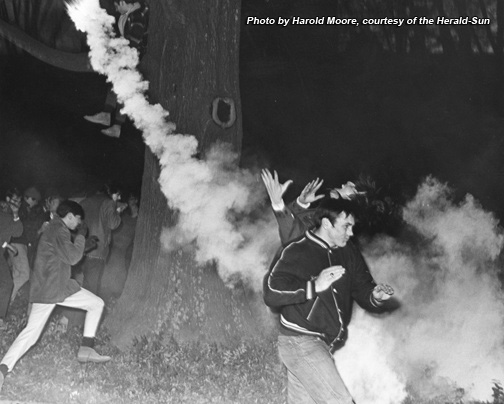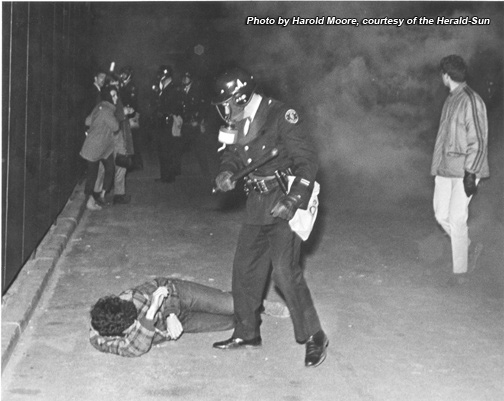1969: Duke building taken over by students protesting racial inequality

DURHAM, N.C. (WTVD) -- Years of protests, negotiation and advocacy culminated in black students at Duke University taking over the first floor of an administrative building in 1969.
A new six-part series airing on ABC is taking a close look at the tumultuous year that was 1969. The docu-series, '1969,' airs Tuesday nights at 10 on ABC11.
The chaotic political and social climate of the time did not spare Durham.
The first black undergraduate students admitted to Duke University arrived on campus in September 1963. However, racism was still a prominent part of their educational experience.
Students formed the Afro-American Society in 1967 to work with university officials to improve race relations. That group called on Duke to make several changes, which group members believed would create more equal educational opportunities and combat institutional racism.
In response to conversations with the Afro-American Society, Duke University created a faculty committee in November 1968 to look into creating an Afro-American curriculum. However, black students were given no voice in selecting the committee's members.
The students pushed back saying it was another example of Duke giving "the appearance of change without actually altering the existing method of making decisions."
In January 1969, 15 percent of the black freshman at Duke flunked out of school.
The unusually high failure rate for black students at Duke started a dialogue about why those students, who had met the Duke entrance requirements, were struggling to succeed at the university. The prevailing thought among the Afro-American Society was that black freshman at Duke faced increased challenges due to "individual and institutional racism at Duke."
A month later, approximately 50 Duke students in the Afro-American Society entered the Allen Building shortly after it opened and barricaded themselves inside.
"We seized the building because we have been negotiating with the Duke administration and faculty concerning different issues that effect black students for 2.5 years. We have no meaningful results. We have exhausted all the so-called proper channels," the students said in a statement published in the Feb. 13, 1969 edition of The Duke Chronicle.
Durham's mayor at the time, Wense Grabarek, placed 240 National Guardsmen on alert in case they were needed.
A group consisting of hundreds of students, most of them white, gathered outside the building in support of their classmates inside.
At a 4 p.m. faculty meeting, Duke President Douglas Knight announced that local police had been called to help deal with the students in Allen Building.
Dozens of faculty members left that meeting in protest. At 4:30, the remaining faculty members and President Knight passed a resolution condemning the actions of the Afro-American Society.
Just after 5 p.m., and after an ultimatum from Duke administrators, the protesting students started to peacefully leave the building.
Minutes later, Durham police officers--who had mobilized outside the Allen Building--entered the rear of Allen Building. They soon emerged out of the front door of Allen Building where the hundreds of white students were gathered in support of the Afro-American Society.
The two groups clashed. Police used pepper spray and launched tear gas into the crowd. More students joined the fray.
The conflict lasted an hour. Twenty students were treated for injuries; five were arrested.
Six weeks later, President Knight resigned citing the need to "protect my family from the severe and sometimes savage demands of such a career."
The Allen Building Takeover did not bring about an immediate solution to all the grievances brought forward by students in the Afro-American Society. However, meaningful change would eventually come and the protest would inspire change and leave a lasting legacy for all students at Duke.
One of the central demands of the students involved in the Allen Building Takeover was getting Duke to create an accredited department for African American Studies. That department was created and is now chaired by Mark Anthony Neal, Ph.D.
"It speaks volumes that the Allen Building Takeover has resonated for virtually every generation of student activist at Duke over the last five decades-that a full 50 years later, it is a beacon of possibility for a generation of Asian and Asian American students making their claim on, not just diversity at Duke, but real inclusion. Duke is not what it once was, but it certainly is not where in needs to be. We can thank those brave souls of 50 years ago for always making that clear to us." -- Neal wrote in a letter published in The Duke Chronicle on Feb. 13, 2019
Decade after decade students at Duke have followed in the footsteps of the Afro-American Society's 1969 Allen Building Takeover. As recently as 2018, students organized a "study-in" outside Allen Building following racist incidents on campus.
An exhibit dedicated to the Allen Building Takeover created by three Duke undergraduates (Alan Ko, Lexi Kadis, Zara Porter)--with the help of a graduate mentor (Ellen Song) and Rubenstein Library staff members--currently greets visitors in the lobby of Duke's Perkins Library.
Those students summed up the lasting impact of the Allen Building Takeover in the following way:
"The radical actions of Duke's black students in the late '60s set the standard for students navigating campus life in the present. Their brave actions helped to inspire future minority students to voice their concerns on a predominantly white college campus. They set a precedent for future students activists to stand up to the administration and to demand a better vision for their University. They ensured that their voices were woven into Duke history. Most importantly , they paved the way for students of all colors and backgrounds to create a space of their own on this campus."


















